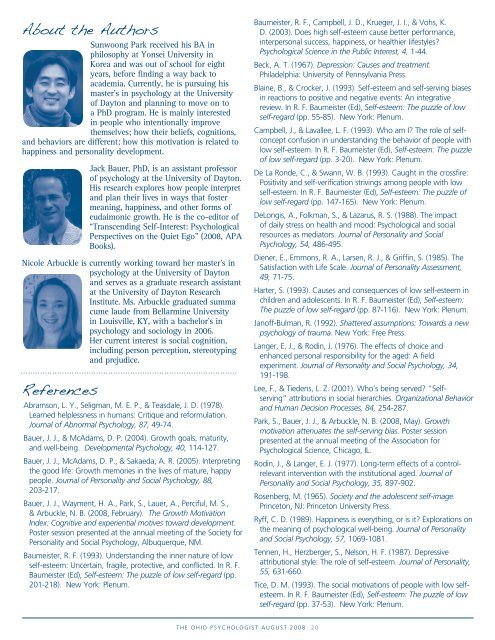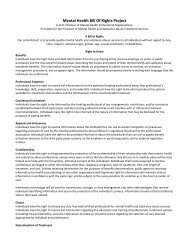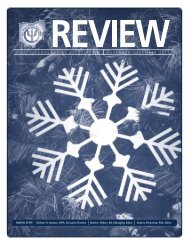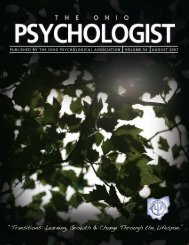2008 Ohio Psychologist - Ohio Psychological Association
2008 Ohio Psychologist - Ohio Psychological Association
2008 Ohio Psychologist - Ohio Psychological Association
Create successful ePaper yourself
Turn your PDF publications into a flip-book with our unique Google optimized e-Paper software.
About the Authors<br />
Sunwoong Park received his BA in<br />
philosophy at Yonsei University in<br />
Korea and was out of school for eight<br />
years, before finding a way back to<br />
academia. Currently, he is pursuing his<br />
master’s in psychology at the University<br />
of Dayton and planning to move on to<br />
a PhD program. He is mainly interested<br />
in people who intentionally improve<br />
themselves; how their beliefs, cognitions,<br />
and behaviors are different; how this motivation is related to<br />
happiness and personality development.<br />
Jack Bauer, PhD, is an assistant professor<br />
of psychology at the University of Dayton.<br />
His research explores how people interpret<br />
and plan their lives in ways that foster<br />
meaning, happiness, and other forms of<br />
eudaimonic growth. He is the co-editor of<br />
“Transcending Self-Interest: <strong>Psychological</strong><br />
Perspectives on the Quiet Ego” (<strong>2008</strong>, APA<br />
Books).<br />
Nicole Arbuckle is currently working toward her master’s in<br />
psychology at the University of Dayton<br />
and serves as a graduate research assistant<br />
at the University of Dayton Research<br />
Institute. Ms. Arbuckle graduated summa<br />
cume laude from Bellarmine University<br />
in Louisville, KY, with a bachelor’s in<br />
psychology and sociology in 2006.<br />
Her current interest is social cognition,<br />
including person perception, stereotyping<br />
and prejudice.<br />
References<br />
Abramson, L. Y., Seligman, M. E. P., & Teasdale, J. D. (1978).<br />
Learned helplessness in humans: Critique and reformulation.<br />
Journal of Abnormal Psychology, 87, 49-74.<br />
Bauer, J. J., & McAdams, D. P. (2004). Growth goals, maturity,<br />
and well-being. Developmental Psychology, 40, 114-127.<br />
Bauer, J. J., McAdams, D. P., & Sakaeda, A. R. (2005). Interpreting<br />
the good life: Growth memories in the lives of mature, happy<br />
people. Journal of Personality and Social Psychology, 88,<br />
203-217.<br />
Bauer, J. J., Wayment, H. A., Park, S., Lauer, A., Perciful, M. S.,<br />
& Arbuckle, N. B. (<strong>2008</strong>, February). The Growth Motivation<br />
Index: Cognitive and experiential motives toward development.<br />
Poster session presented at the annual meeting of the Society for<br />
Personality and Social Psychology, Albuquerque, NM.<br />
Baumeister, R. F. (1993). Understanding the inner nature of low<br />
self-esteem: Uncertain, fragile, protective, and conflicted. In R. F.<br />
Baumeister (Ed), Self-esteem: The puzzle of low self-regard (pp.<br />
201-218). New York: Plenum.<br />
Baumeister, R. F., Campbell, J. D., Krueger, J. I., & Vohs, K.<br />
D. (2003). Does high self-esteem cause better performance,<br />
interpersonal success, happiness, or healthier lifestyles<br />
<strong>Psychological</strong> Science in the Public Interest, 4, 1-44.<br />
Beck, A. T. (1967). Depression: Causes and treatment.<br />
Philadelphia: University of Pennsylvania Press.<br />
Blaine, B., & Crocker, J. (1993). Self-esteem and self-serving biases<br />
in reactions to positive and negative events: An integrative<br />
review. In R. F. Baumeister (Ed), Self-esteem: The puzzle of low<br />
self-regard (pp. 55-85). New York: Plenum.<br />
Campbell, J., & Lavallee, L. F. (1993). Who am I The role of selfconcept<br />
confusion in understanding the behavior of people with<br />
low self-esteem. In R. F. Baumeister (Ed), Self-esteem: The puzzle<br />
of low self-regard (pp. 3-20). New York: Plenum.<br />
De La Ronde, C., & Swann, W. B. (1993). Caught in the crossfire:<br />
Positivity and self-verification strivings among people with low<br />
self-esteem. In R. F. Baumeister (Ed), Self-esteem: The puzzle of<br />
low self-regard (pp. 147-165). New York: Plenum.<br />
DeLongis, A., Folkman, S., & Lazarus, R. S. (1988). The impact<br />
of daily stress on health and mood: <strong>Psychological</strong> and social<br />
resources as mediators. Journal of Personality and Social<br />
Psychology, 54, 486-495.<br />
Diener, E., Emmons, R. A., Larsen, R. J., & Griffin, S. (1985). The<br />
Satisfaction with Life Scale. Journal of Personality Assessment,<br />
49, 71-75.<br />
Harter, S. (1993). Causes and consequences of low self-esteem in<br />
children and adolescents. In R. F. Baumeister (Ed), Self-esteem:<br />
The puzzle of low self-regard (pp. 87-116). New York: Plenum.<br />
Janoff-Bulman, R. (1992). Shattered assumptions: Towards a new<br />
psychology of trauma. New York: Free Press.<br />
Langer, E. J., & Rodin, J. (1976). The effects of choice and<br />
enhanced personal responsibility for the aged: A field<br />
experiment. Journal of Personality and Social Psychology, 34,<br />
191-198.<br />
Lee, F., & Tiedens, L. Z. (2001). Who’s being served “Selfserving”<br />
attributions in social hierarchies. Organizational Behavior<br />
and Human Decision Processes, 84, 254-287.<br />
Park, S., Bauer, J. J., & Arbuckle, N. B. (<strong>2008</strong>, May). Growth<br />
motivation attenuates the self-serving bias. Poster session<br />
presented at the annual meeting of the <strong>Association</strong> for<br />
<strong>Psychological</strong> Science, Chicago, IL.<br />
Rodin, J., & Langer, E. J. (1977). Long-term effects of a controlrelevant<br />
intervention with the institutional aged. Journal of<br />
Personality and Social Psychology, 35, 897-902.<br />
Rosenberg, M. (1965). Society and the adolescent self-image.<br />
Princeton, NJ: Princeton University Press.<br />
Ryff, C. D. (1989). Happiness is everything, or is it Explorations on<br />
the meaning of psychological well-being. Journal of Personality<br />
and Social Psychology, 57, 1069-1081.<br />
Tennen, H., Herzberger, S., Nelson, H. F. (1987). Depressive<br />
attributional style: The role of self-esteem. Journal of Personality,<br />
55, 631-660.<br />
Tice, D. M. (1993). The social motivations of people with low selfesteem.<br />
In R. F. Baumeister (Ed), Self-esteem: The puzzle of low<br />
self-regard (pp. 37-53). New York: Plenum.<br />
THE OHIO PSYCHOLOGIST AUGUST <strong>2008</strong> 20











